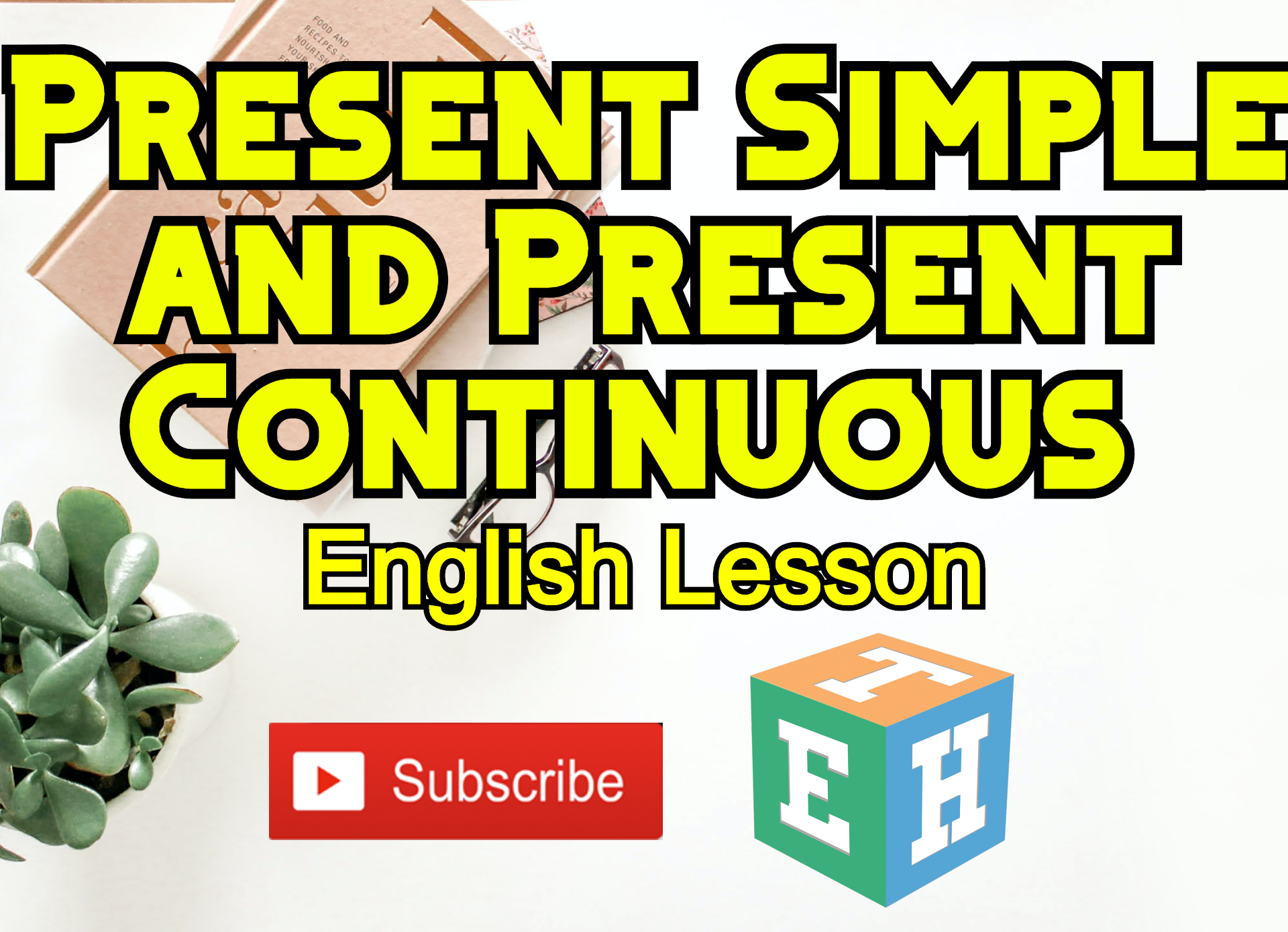Present Simple and Present Continuous
In this aspect of tutorial for beginners, learners are going to differentiate “ Present Simple Vs. Present Continuous”. What are the differences between “Present Simple Vs. Present Continuous”. What are the rules in forming “Present Simple Vs. Present Continuous”. How “Present Simple Vs. Present Continuous” use in a sentence?
In this lesson, yo will become competent in using “Present Simple Vs. Present Continuous” in a sentence to express more complex ideas.
Present Simple
Verb 1
Rules for forming s-forms
1. Add –es to verbs ending in s, ss, ch, x and o: pass- passes, brush-brushes, go-goes
2. Change y to i before adding –es to verbs ending in y preceded by a consonant:
cry-cries, fly-flies. If a vowel precedes y, only an s is added: play-plays.
Pronunciation:
–es pronounced (iz) after s, ss, ch, sh,x and g or ge as in oranges (orindziz)
Present Continuous
(is, am, are)+ verb-ingDrop e if e is silent; as write-writing (But written), move-moving, live-living,
tremble-trembling.
Exceptions: see-seeing, agree-agreein
Change ie to y, as, die-dying, lie- lying, tie-tying.
Note: ski-skiing
Double the last consonant in one-syllable words with one vowel ending in one consonant; as, stop-stopping, dig-digging, beg-begging, run-running, rob-robbing,
spin-spinning.
Apply Rule (3) to two-syllable words stressed on the second syllable; as,
begin-beginning, occur-occurring, refer-refer-referring.
Another l may, or may not, added to words ending in l.
American Usage: travel- traveling, quarrel-quarreling
British Usage: travel-travelling- quarrel- quarrelling
Uses
Present Simple
To express repeated action in genera. (The situation or the fact is permanent as considered by the speaker.)
Bangkok stands in Chowpraya.
Clouds produce rain.
I drink tea. (It’s my habit.)
To express future action (with verbs of arriving or departing)
We leave tomorrow.
The train leaves early tomorrow.
To express non- action, state or condition with non-conclusive verbs (= verbs that indicate a mental state or emotion).
She loves her children.
I remember him.
I hear some music.
Note: The more usual construction with non- conclusive verbs (like those in the righthand column) is can+ infinitive:
I can hear some music.
I can smell something burning.
I can see a train coming.
Present Continuous
To express a specific activity that is happening at the time of speaking (The situation or the fact is temporary).
John is standing by the fire.
The clouds are moving across the sky.
I am drinking tea.
To express future action (the speaker is very sure of the action to happen).
We are leaving tomorrow.
The ship is sailing next week.
This tense is NOT USED with non-conclusive verbs like the following:
Not She is loving…
Not I am remembering…
Not I am hearing…
| See Remember Want Love Hate Understand Seem Contain Refuse Own Feel (that) appear | Hear Forget Need Like Dislike Believe Resemble Consist (of) Forgive Possess Think (that) | Smell Suppose Desire Prefer Detest Think Mean Belong(to) Matter Notice look | Taste Wish know |
Exercise
A. Put the verbs in parenthesis into the correct Present Tense, either Continuous or Simple.
1. Buses usually (run) ________ along this street, but today they (not run) ________ because it is under repair.
2. Dang (pass) ________ the post office on his way to work everyday.
3. She usually (sit) ________ at the back of the class, but today she (sit) ________in the front row.
4. I rarely (carry)________ an umbrella, but I (carry) ________one now because it is raining.
5. What (you get generally do) ________ for a living?
6. (You enjoy) ________ your English class today?
7. (You enjoy) ________ washing dishes as a rule?
8. We nearly always (spend) ________our holidays at the seaside, but this year we are going to France.
9. Mr. Jones usually (sell) ________ only newspapers, but this week he (sell) ________ magazines as well.
10. (You wash) ________ your hand before every meal?
11. Ladda generally (begin) ________ cooking at 11, but today she comes home early and (cook) ________now, although it is only 10:30.
12. I’m sorry you can’t see her. She usually (wake) ________ much earlier.
13. Why (you wear) ________ a coat this morning? I never (ware)________ one until October.
14. Anong still (do) ________ her homework. Her sister, who always (wear) _______smore quickly.
15. This builders generally (build) ________ very rapidly. They (work) ________ at present on two separate contracts.
16. What (you do) ________ at this moment? If you (not do) ________ anything, please help me.
17. Witchit, who (study) ________ medicine at present, hopes to go abroad after graduating.
18.He generally (come) to my office every day but today he (visit) ________ his parents in the country.
19. (You watch) ________ television often? The electrician (install) ________ours at this moment.
20. Mary usually (wear) ________ a hat to go shopping, but today, as the sun (not shine) ________, she (not wear) ________ one.
B. The following sentences all refer to the present time. Put the verbs into the correct tense, either the Present Continuous or the Present Simple.
1. (You see) ________ the house on the corner? That is where I was born.
2. (You listen) ________ to what I am saying? (You understand) ________ me?
3. I (notice) ________ Mary is wearing a new hat today.
4. She (not understand) ________ what you (mean) ________.
5. I need ________ a new suit. They (offer) ________ special prices at the tailor’s this week.
6. (You smell) ________ gas? I (think) ________ the new stove is leaking.
7. Look at Mary! She (drink) ________ up her medicine, but I can see that she (hate) ______ it.
8. Dang (seem) ________ rather tired today.
9. It (still rain) ________ but it (look) ________ as if it will soon stop.
10. (You mind) ________ helping me a moment? I (try) ________ to mend this table.
11. Ask him what he (want) ________.
12. (You remember) ________ the name of that girl who (walk) _______ on the other side of the street?
13. “Will you have some whisky?” “I (prefer) ________beer, please.”
14. I (suppose) ________ I must go now; my wife (wait) ________ for me at home.
15. (You see) ________ this box? It (contain) ________ matches.
16. These twins, who (resemble) ________each other so strongly, (study) ________ art at present.
17. After what has happened, (you really mean) ________ to say that you still (believe) ________him?
18. (You suppose) ________ that the children (still sleep) _______?
19. The train still (stand) ________ in the station. (You think) ________ we can catch it? 20. I (notice) ________ you (possess) ________ a copy of Lert and Pinyo’s latest book. Will you lend it to me?
For more readings
- TOO and ENOUGH | Use and Meaning in English
- The difference between “a little” and “little”
- The Difference between A FEW and FEW in English
- When to use “a little” and “a few”: English Grammar Rules
- Compound Words: English Vocabulary
- The difference between MUST and HAVE TO
If you have any questions or suggestions about Present Simple and Present Continuous, please feel free to leave a comment below or send us a message using our contact page.

